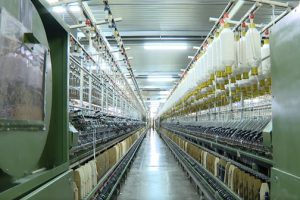
Manufacturing enterprises in Ethiopia play a significant role in the country’s economic development and job creation. Ethiopia has been actively promoting industrialization as a key strategy for achieving sustainable economic growth and transforming its predominantly agrarian economy. The manufacturing sector is considered a priority area for investment and has received substantial attention and support from the government.
Manufacturing enterprises in Ethiopia cover a wide range of industries, including textiles and apparel, leather and footwear, food and beverages, chemicals, pharmaceuticals, construction materials, electronics, and more. These industries contribute to both domestic consumption and export markets.
One of the key advantages of manufacturing in Ethiopia is the availability of a large and relatively low-cost labor force. The country’s young and growing population provides a significant demographic dividend, making it an attractive destination for labor-intensive industries. Additionally, Ethiopia’s strategic location and improving infrastructure offer opportunities for trade both within Africa and with international markets.
According to the documents form Ethiopian Enterprise Development, Ethiopian government has implemented various policies and programs to attract investment and support the growth of manufacturing enterprises. This includes the establishment of industrial parks and special economic zones, providing infrastructure, utilities, and incentives to businesses. The government has also offered investment incentives such as tax exemptions, import duty waivers, and access to finance for manufacturing enterprises.
In recent years, Ethiopia has seen an increase in foreign direct investment (FDI) in the manufacturing sector, particularly in areas such as textiles and garments. The government’s focus on export-oriented industrialization has led to the development of manufacturing clusters and export zones, providing opportunities for businesses to tap into global markets.
The Ethiopian government has established several industrial parks across the country to attract manufacturing investments. These parks provide infrastructure, utilities, and various incentives to encourage local and foreign companies to set up manufacturing operations. Besides, the government offers various investment incentives to manufacturing enterprises, such as tax holidays, import duty exemptions on machinery and raw materials, and repatriation of profits.
Ethiopia has also implemented export promotion policies to encourage manufacturing companies to focus on producing goods for export. Export-oriented manufacturing enterprises can benefit from various incentives, including tax exemptions and access to foreign exchange. The government has established financial institutions and programs to support manufacturing enterprises in accessing finance and investment capital. These include the Development Bank of Ethiopia and various loan guarantee schemes.
Moreover, the government is working on the Public-Private Partnerships (PPPs). Accordingly, the government actively seeks partnerships with the private sector to develop manufacturing projects. PPPs provide opportunities for collaboration between the government and private enterprises in infrastructure development, industrial parks, and other manufacturing initiatives.
While the manufacturing sector in Ethiopia has experienced notable growth, challenges remain. These challenges include limited access to finance, infrastructure gaps, and among others. However, the government continues to work on addressing these issues and creating an enabling environment for manufacturing enterprises to thrive.
In a bid to improve operational performance and overcome challenges, manufacturing enterprises in Ethiopia are urging for consistent and reliable incentives. On top of that, companies such as Colba Tannery PLC and Alma-Kir Textile Industry have highlighted the importance of government support, particularly in addressing the shortage of foreign currency that is hindering their growth. With a growing demand for their products both domestically and internationally, Habtamu Shiferaw, the Managing Director of Colba Tannery PLC emphasizes the need for sustained assistance to enhance production capacity and take advantage of available opportunities.
Colba Tannery PLC, a prominent player in the leather industry, has been grappling with a shortage of foreign currency. According to him, the company, which is involved in manufacturing and exporting shoe upper leather, hide garment leathers, upholstery leather, shoe lining, belt and other technical leathers, relies on imported manufacturing chemicals. The scarcity of foreign currency has severely impacted their ability to purchase these essential materials, leading to a decline in their operational performance. He further expressed his hope that the government would provide them with the necessary support in accessing foreign currency, as they have been instrumental in creating value-chain linkages.
Similarly, Alma-Kir Textile Industry, a key player in the textile sector, faces similar challenges. Nahom Fitsum, the Marketing Manager of Alma-Kir, highlighted the scarcity of foreign currency as a significant hurdle for the industry. While the government has introduced initiatives to facilitate access to limited amounts of foreign currency, the demand in the market continues to outstrip the supply. Enterprises like Alma-Kir are eager to expand their production capacity to meet the growing demand and capitalize on the available opportunities.
Recognizing the critical role played by manufacturing enterprises in Ethiopia’s economy, the government has been providing financial and technical support to these companies. Habtamu Shiferaw of Colba Tannery PLC acknowledged the government’s efforts in creating platforms for enterprise integration, enabling collaborations and linkages among businesses. However, he stressed the need for sustained support to overcome the challenges posed by the shortage of foreign currency, particularly in procuring manufacturing chemicals.
Nahom Fitsum of Alma-Kir Textile Industry for his part expressed gratitude for the government’s initiatives and its assistance in accessing limited amounts of foreign currency. Nevertheless, he emphasized the ever-increasing demand in the market, which necessitates further growth in production capacity. The government’s support is crucial in enabling enterprises to meet this demand and capitalize on the opportunities available in the textile sector.
Steady incentives are vital for the long-term growth and sustainability of manufacturing enterprises in Ethiopia. Alebachew Nigussie, the Director General of Ethiopian Enterprise Development (EED), revealed that over 26,000 manufacturing enterprises are currently operating in the country. The government’s annual expenditure of six billion Birr to subsidize these enterprises underscores their importance to the national economy.
As to him, steady incentives not only alleviate the challenges faced by businesses but also foster an environment conducive to investment and growth. Reliable access to foreign currency, financial support, and technical assistance enable companies to enhance their operational performance, expand their production capacity, and meet the rising demand in both domestic and international markets.
Mentioning that invigorating the efforts, and supporting the development of manufacturing enterprises is mandate for EED, the director-general reaffirmed the government’s commitment in resolving challenges in the manufacturing sector as it is an important sector for social justice and pivotal for job creation
Through ensuring a stable and supportive business environment, the government can stimulate economic growth, create employment opportunities, and attract investment in the manufacturing sector, he noted.
Overall, manufacturing enterprises in Ethiopia are poised to contribute significantly to the country’s economic transformation, job creation, and export earnings. With the government’s continued support and ongoing reforms, the manufacturing sector is expected to play an increasingly important role in Ethiopia’s development trajectory.
The call for steady incentives from manufacturing enterprises in Ethiopia highlights the need for sustained support to address the challenges hindering their growth. The scarcity of foreign currency remains a significant obstacle, impacting their ability to procure essential materials and meet market demands. The government’s financial and technical assistance, along with initiatives to facilitate access to foreign currency, are steps in the right direction. However, a continued focus on providing steady incentives is necessary to unlock the full potential of the manufacturing sector, promote job creation, and drive economic growth in Ethiopia.
BY HIZKEL HAILU
THE ETHIOPIAN HERALD FRIDAY 22 DECEMBER 2023




